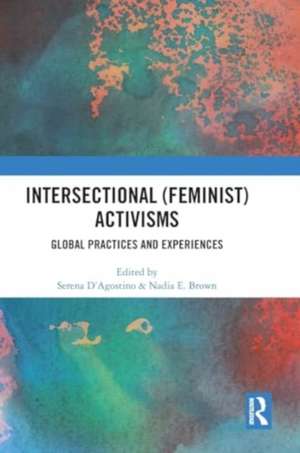Intersectional (Feminist) Activisms: Global Practices and Experiences
Editat de Serena D’Agostino, Nadia E. Brownen Limba Engleză Hardback – 16 aug 2024
This edited volume tackles two main questions: first, what are the main claims, struggles, and possibilities of contemporary intersectional feminisms; and second, how shall we, as scholars, address intersectional (feminist) activisms in our research – theoretically, methodologically, and empirically. These issues are debated from several intersectional (feminist) perspectives, locations, and positionalities. The globally oriented and empirically grounded scope of this volume is undeniable. This book goes beyond the Western hegemony in intersectionality-related research and knowledge production, bringing in practices, experiences, and critical perspectives of intersectional (feminist) scholars and activists who are not necessarily located in the most privileged social, political, and financial milieus.
This book will be of interest to students and scholars from across the social sciences and humanities with an interest in intersectionality, gender, feminism, racism, LGBT+ and queer studies, activism and social movement studies. The chapters in this book were originally published as a special issue of Journal of Women, Politics, and Policy.
Preț: 939.46 lei
Preț vechi: 1145.68 lei
-18% Nou
Puncte Express: 1409
Preț estimativ în valută:
179.92€ • 185.37$ • 150.72£
179.92€ • 185.37$ • 150.72£
Carte tipărită la comandă
Livrare economică 22 februarie-08 martie
Preluare comenzi: 021 569.72.76
Specificații
ISBN-13: 9781032749242
ISBN-10: 1032749245
Pagini: 168
Dimensiuni: 178 x 254 mm
Greutate: 0.47 kg
Ediția:1
Editura: Taylor & Francis
Colecția Routledge
Locul publicării:Oxford, United Kingdom
ISBN-10: 1032749245
Pagini: 168
Dimensiuni: 178 x 254 mm
Greutate: 0.47 kg
Ediția:1
Editura: Taylor & Francis
Colecția Routledge
Locul publicării:Oxford, United Kingdom
Public țintă
Postgraduate, Undergraduate Advanced, and Undergraduate CoreCuprins
Introduction - Bringing Activism Back In 1. Studying Latina Mobilization Intersectionally, Studying Latinas Mobilizing Intersectionality 2. Intersectional Feminist Activism and Practices of Transformation: Perspectives from Indian Feminisms 3. At the Intersections of Gender Inequality and State Fragility in Africa 4. De-Whitening Romani Women’s Intersectional Experience 5. Affirming Fissures: Conceptualizing Intersectional ‘Ethnic’ Feminism in Aotearoa New Zealand 6. Intersectional Politics of the International Women’s Strike 7. Confronting Anti-Muslim Racism and Islamism: An Intersectional Perspective on Muslim Women’s Activism in Germany 8. Solidarity Through Difference? How Italian and Spanish LGBTQIA* Organizations Frame Solidarity Through an Intersectional Lens 9. Strategies of Resistance in the Everyday: The Political Approaches of Black Women Living in a Public Housing Development in Chicago 10. Feminists, Nationalist, Combatants, Activists. A Conversation with Vjosa Musliu on the Multi-Faceted Role of Women in Kosovo
Notă biografică
Serena D’Agostino is Senior Researcher in Political Science at Vrije Universiteit Brussel and Universiteit Antwerpen, Belgium. Her work has been published in the European Journal of Politics and Gender, International Feminist Journal of Politics, Journal of Diversity and Gender Studies, Journal of Women, Politics & Policy, and Politics, Groups, and Identities, among others.
Nadia E. Brown is Professor of Government and Director of the Women’s and Gender Studies Program at Georgetown University, Washington, DC, USA. She is co-author of Sister Style: The Politics of Appearance for Black Women Political Elites (2021).
Nadia E. Brown is Professor of Government and Director of the Women’s and Gender Studies Program at Georgetown University, Washington, DC, USA. She is co-author of Sister Style: The Politics of Appearance for Black Women Political Elites (2021).
Descriere
The edited volume tackles two main questions: first, what are the main claims, struggles, and possibilities of contemporary intersectional feminisms; and second, how shall we, as scholars, address intersectional (feminist) activisms in our research – theoretically, methodologically, and empirically.
